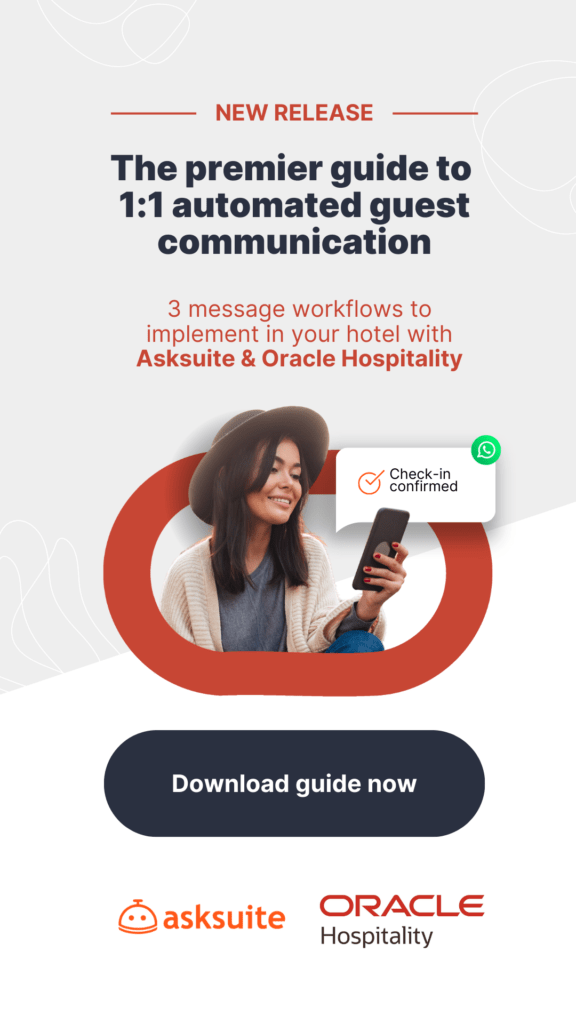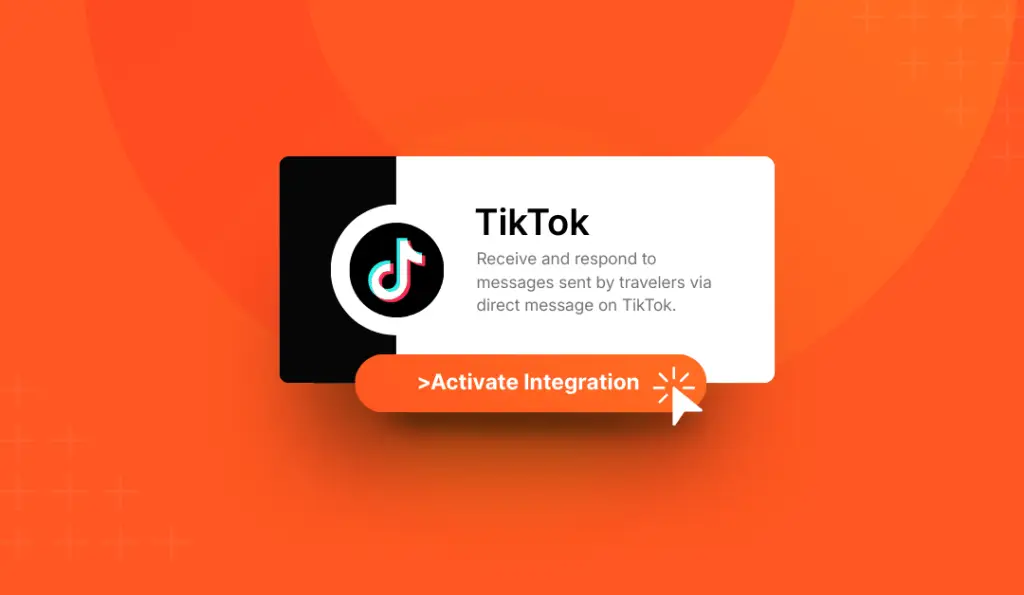Whether through Reservations, Front-desk, or Call centers, hotels receive a huge volume of phone calls every day. Inarguably, the more calls a hotel gets, the higher the chances of mistakes, and that is why in this article we’re going to explain 5 hotel call center mistakes that can cause heavy losses for a hotel’s revenue. Here they are:
- Forget to identify the traveler
- Not keep track of metrics
- Not answer during busy times
- Give agents no autonomy to sort customers’ problems on the spot
- Not follow a script
Keep reading to find out how these mistakes happen and how they can affect your business.
1. Forget to identify the traveler
A hotel agent has two jobs: solving customers’ problems and selling rooms. For that, they need to handle commonly asked questions, which agents have all but memorized.
Is the hotel pet friendly?
Does the hotel charge for kids?
What is the check-in time?
Such mundane questions can become so common that agents may forget to collect contact info such as the caller’s name, phone number, and email. Agents might reply so instinctively that before they can engage the traveler in a conversation, they’ve already hung up.
In our webinar, “Sales & Reservations’ Best Habits”, Doug Kennedy, President of the Kennedy Training Network, Inc., shared incredible tips on how agents can turn inquiries into bookings. Also, learn the right questions to ask to get travelers to engage and see the value of staying with you. Hit play!
Identifying travelers is a must. A caller might be on the initial stages of the buying journey, looking for great deals and services that set hotels apart, and the booking may happen at a later time. That is why you need to have information enough to call back, send a message, or email and give them a final nudge to complete the booking.
2. Not keep track of metrics
When was the last time you checked your call center performance stats?
During one of these checks, one of our customers found out that 15% of his calls were being directed to a busy line! Can you imagine the frustration these then-unlikely-guests felt as they waited in a never-ending loop of cheerful songs playing in the background?
A 2022 report from Asksuite showed that 35.4% of hotels don’t know what their call abandonment rates are, while 30.7% affirmed that travelers give up on a call if the line rings more than 3 times. See the numbers:
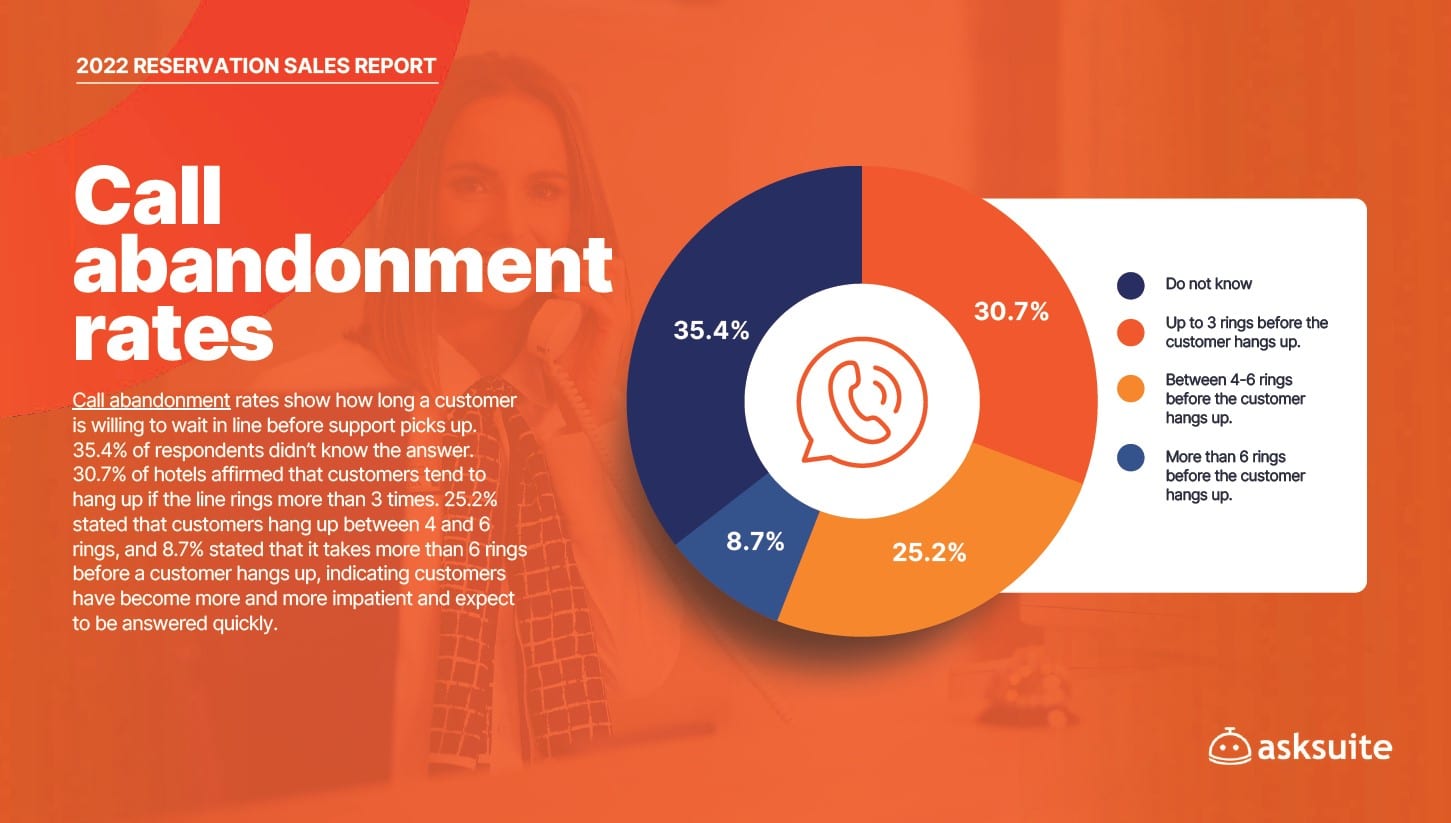
During high seasons, these issues intensify and reflect in hotels’ total number of bookings, since potential guests can be forgotten in the long wait lines.
Therefore, it’s important to take the time to check the numbers. And get a closer look at how often your call center’s busy lines are pulling travelers off before an agent can pick it up.
A report on call center’s KPIs published last year showed that the call abandonment rate in call centers got to 6.44% in 2021 (TalkDesk). Despite that, specialists advise the ideal number should be no higher than 2%.
Do you want to get an insiders view of how customer service performance is handled by hotels all over the world? Download our 2022 report! It’s free.
3. Not answer during busy times
Requests and inquiry times have changed in hotels. We’ve noticed an increase in the demand outside business hours:
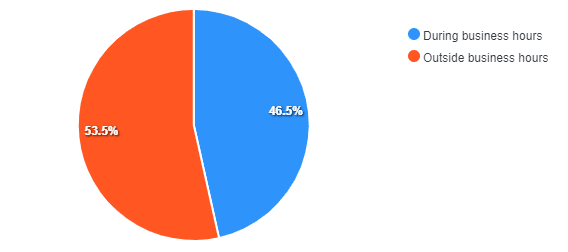
Moreover, demand on Sundays is as high as on Fridays. So, think about all the calls you get on Fridays and imagine how many opportunities you are missing on Sundays:
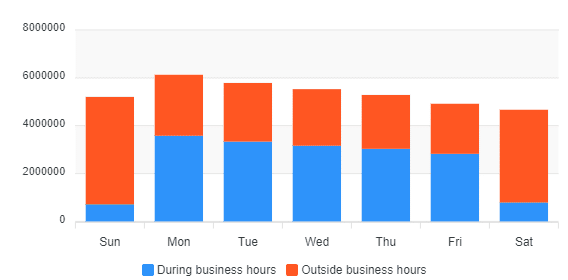
Different from call centers, reception usually works 24/7, but what should hotels do when it’s closed?
The answer: teach your front desk teams to negotiate. Prepare them to offer price quotes and have a margin to negotiate, pre-approved by management.
In this episode of the Hotel Cast Podcast, we chat with Shona Whitehead, Managing Partner of Cogent Blue, about how to optimize hotel commercial performances, the best practices in revenue management right now, and the relationship between the commercial teams and hotel techs.
4. Give agents no autonomy to sort customers’ problems on the spot
Perhaps agents believe sending travelers to the hotel’s website is the perfect solution. After all, nearly all answers to any objection can be found there with videos and photos. The website is projected to guide the user to click on “book now”.
That is a mistake. The last thing a call center should do is send travelers to any communication channel other than the one they first chose to solve doubts.
If someone gets in touch via a phone call instead of a text message, for example, it means they want to use that channel, period. Don’t overcomplicate the booking journey.
Changes in the flow of communication like this create some of the worst customer experiences. It should always be a last resource. But of course, to achieve that, agents need to be well-prepared to handle most situations.
In this episode of Hotel Cast with Žana Usher, coach for training staff in the hospitality sector, we talked about guest expectations and how to drive sales through staff training. Hit play!
5. Not follow a script
Following a script is one of the most essential directives a call center should follow. Besides being an excellent tool to train new agents, a script works like a manual and helps standardize service and prepare agents for unexpected situations.
Often, we have a difficult time making others understand what we are saying on the other end of the line. This happens because most of us speak quickly as a habit.
But this should never bleed into service. With a script, the choice of words is pre-selected and can help send the message your brand wants to convey.
Finally, a script shouldn’t be followed to the dot, or agents might lose their capacity to improvise and be flexible. Instead, a script is a tool that can help greatly if applied correctly.
Reduce hotel call center mistakes
Don’t forget to review your call center key metrics to find out how the quality of service is going or how many calls are being converted to bookings, etc.
Small-yet-strategic changes can make a huge difference in the total revenue coming from your call center. Surely, you’re bound to notice a boost in client satisfaction and get more direct sales.
Watch our Webinar and see valuable insights from three specialists on the subject!


